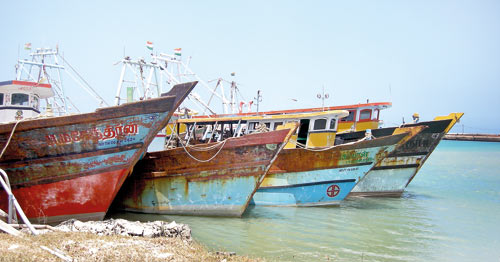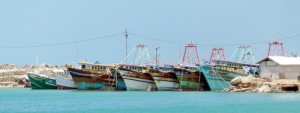News
Buyers of illegally caught fish have duty to ensure ocean resources are not depleted
Countries which buy fish poached by Indian fishermen using destructive bottom trawlers in Sri Lankan seas have obligations under international conventions to ensure that oceanic resources are maintained, a maritime law expert said this week.
“Even if you divide them up, the oceans are one,” said Nirmala Chandrahasan, author of the book ‘Maritime Boundaries in the Indian Ocean: Sri Lanka and the Law of the Sea’.
“If you are depleting the resources in one area, it has consequences on others.”

Indian boats. Pix by Athula Devapriya
“These people (Indian fishermen) come in and even remove the finger fish, destroy the ecosystem,” the Chennai-based Sri Lankan lawyer said. “Just because they have made their area barren, they have come to our side. It is in the interest of India, too, to cooperate in maintaining marine resources.”
Sri Lanka has been locked in a protracted fishing dispute with India. Every week, swarms of fishermen from the State of Tamil Nadu intrude into Sri Lankan waters and use bottom trawlers to rake up everything on the seabed. They leave behind a trail of destruction, while Sri Lankan fishermen—who use smaller boats and nets—watch helplessly from the shore. There is evidence to show that Indian bottom trawling is causing serious ecological damage. A lot of their catch is imported by Europe.
“The Convention of the Law of the Sea sets out the rules under which boundary demarcations are made,” Mrs. Chandrahasan said. “Treaties are binding. It is a principle of international law that treaties are binding. If treaties are not binding, there is no law.”
“If India is unwilling to consider this boundary treaty, what about its treaties with China, Nepal and so on?” she asked. “You can’t break a boundary treaty in one place and expect others to recognise your present boundaries somewhere else.”
From the earliest times, the Palk Strait, the Palk Bay and the Gulf of Mannar were known as the historical waters of India and Sri Lanka. After the countries gained independence from the British, the seas were divided between them through the boundary treaties of 1974 and 1976. Each country exercises sovereignty and jurisdiction over its section of sea.
In addition to this, Sri Lanka declared its portion of territorial sea as ‘internal waters’. “Unlike in territorial seas, there is no right of innocent passage in internal waters,” Mrs. Chandrahasan said. “Our position, therefore, is even stronger in that area because other ships can’t come into internal waters.”
Referring to the boundary treaties between the two countries, she said Article 4 of 1974 stipulates that, “each State shall have sovereignty and exclusive jurisdiction and control over the waters, the Islands, the Continental Shelf and the sub soil on its side of the Maritime boundary in the Palk Strait and Palk Bay and Kachchativu Island was determined as falling within Sri Lankan waters”.
Article 5 of the same agreement provides that “Subject to the foregoing, Indian fishermen and pilgrims will enjoy access to visit Kachchativu as hitherto, and will not be required by Sri Lanka to obtain travel documents or visas for these purposes.” Article 6 of the Agreement states that, “The vessels of India and Sri Lanka will enjoy in each other’s waters such rights as they have traditionally enjoyed therein.”
Mrs. Chandrahasan observed that, “Some people on the Indian side have been taking this Article out and saying this gives them the rights they have traditionally enjoyed therein. But the answer to that lies in the subsequent Exchange of Letters between the Government of India and Sri Lanka which categorically says that fishing vessels and fishermen of each country shall not engage in fishing in the historic waters, the territorial seas or their Exclusive Economic Zones without “express permission”.
While the legal position is clear, the practical situation is murky. Mrs. Chandrahasan said the answer may lie in Article 123 of the Law of the Sea Convention. It holds that, in enclosed and semi-enclosed seas, the bordering states should cooperate “in management, conservation, exploration and exploitation” of those waters. She said the initiative could start with the setting up of a research centre in Katchchativu from which Indian and Sri Lankan scientists could conduct a stock assessment to see how much of the fisheries were left.
“Countries should not try to exploit the seas but get together and manage, conserve resources in the interests of all,” she stressed. “Rather than using bottom trawling and destroying fisheries and the ecosystem, all countries must look at it from the point of view of sustainability.”
| Legal position on territorial seas Nirmala Chandrahasan in a presentation to the National Science Foundation this week outlined the legal position regarding territorial seas. Excerpts: - Territorial sea is under the sovereignty of the coastal state which has the same powers as over land territory and resources of this zone. - In the Exclusive Economic Zone, the coastal state may make laws and regulations and take conservation measures, all of which must be complied with by nationals of other states. - Article 62(4) of the Law of the Sea Convention states that these laws and regulations must be consistent with the Convention and relate to the following: Licensing of fishermen and fishing boats; determining the species that may be caught, fixing quotas, regulating seasons and areas of fishing; number of fishing vessels; gear to be used; conditions relating to joint ventures. Many of these matters are regulated by national legislation. - Under these Acts, authorised officers are given the power to stop, board and search foreign vessels in Sri Lanka waters, and to seize and detain any fishing vessel or arrest any person where they have grounds to believe an offence has been committed. - Local fishermen also have to be licensed and their vessels have to be registered. - Foreign fishing boats are prohibited from fishing except under a permit and this, too, only in respect of areas which have not been restricted for the use of local fishermen. Local as well as foreign fishermen have to observe rules regarding the use of explosives and poisonous substances which are prohibited. Northern fishermen demand strict Govt. action against poaching by Indian ‘brethren’ A group of northern fishermen federations demanded the Government strictly enforce the law against poaching by Indian fishermen, in Sri Lanka’s territorial waters across the Palk Strait. The fishermen unions alleged that since the start of the Indo-Lanka fishermen poaching issue, the Sri Lanka Government has failed to take effective action against those poaching in Lankan waters. They said the Indian fishermen engaged in poaching have been arrested by the Sri Lanka Navy for trespassing into Lankan waters and prosecuted under immigration law in Magistrates’ courts. The fishermen’s unions representing five districts in the Northern province is to file a writ application in the Court of Appeal to direct the Government for the effective implementation of the Foreign Fishing Vessels Act which is more harsh than the immigration law. The fishermen’s leaders claimed they are compelled to take legal action through the courts as the Government has failed to solve this problem by enforcing the existing the laws. Mannar District Fishermen’s Cooperative Society Union President, N.M. Mohamed Alam told the Sunday Times that the governments in the past addressed the poaching issue to suit their own political interests, and were not willing to find a comprehensive solution. “We have no issue with the Indian fishermen other than fishing in our sea. They are our brethren, what we ask the Government is to enforce the existing laws against whoever violates it,” he said. (SR)
|


